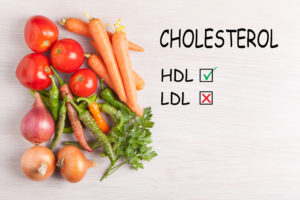
In most cases, yes. But cholesterol can also be helpful. You actually need it to build healthy cells. Really, cholesterol is all about management. Separating the good from the bad and recognizing that cholesterol can serve various purposes in your body.
High cholesterol is never really a good thing. When your cholesterol readings are coming up high, you’ve got too much of this fat circulating in your blood, and it’s likely accumulating along arterial walls. This accumulation is known as atherosclerosis.
Atherosclerosis boosts blood pressure by narrowing and tightening arteries. In turn, high cholesterol is a risk factor for heart disease.
But wait. Not all cholesterol is created equal.
The stuff that clogs your arteries is a form of low-density lipoprotein or LDL. It’s called “bad” cholesterol. But “good” cholesterol also exists. It’s called high-density lipoprotein, or HDL, and it floats through your bloodstream and helps remove LDL deposits from blood vessels.
HDL is actually a negative risk for heart disease, meaning it lowers the risk.
There is even “neutral” cholesterol. These cholesterols float through your body and don’t really do anything from a health standpoint. They aren’t harming you, but they are not helpful either.
Where do these cholesterols come from? Two places. Your body manufactures its own cholesterol in the liver. You also get it from food. Unless you’ve got a condition called hypercholesterolemia, you’re producing safe amounts of cholesterol.
Most of the time.
You see, your body produces “bad” LDL cholesterol. But there’s a caveat: it produces it at a level you actually need. Things can spiral out of control, and you can develop high cholesterol when you do, or don’t do, certain things.
For example, diet can play a major role in cholesterol. But not in the way you might think. Eggs and meat are generally high cholesterol foods. These foods, however, which contain natural cholesterol and saturated fats, appear to be neutral in the body.
High sugar-foods, on the other hand, or those cooked in hydrogenated or other man-made fats can lead to increases in blood cholesterol. Put simply, eating processed foods can boost “bad” cholesterol and influence heart disease risk.
There are also foods that can improve cholesterol by promoting more HDL. It might be strange to think, but more “HDL can actually help you. You can boost HDL by eating healthy fats from nuts, avocado, olive oil, and fatty fish.
Exercise and activity also have a positive influence on cholesterol production.
Hopefully, that helps clear up some of your cholesterol confusion!